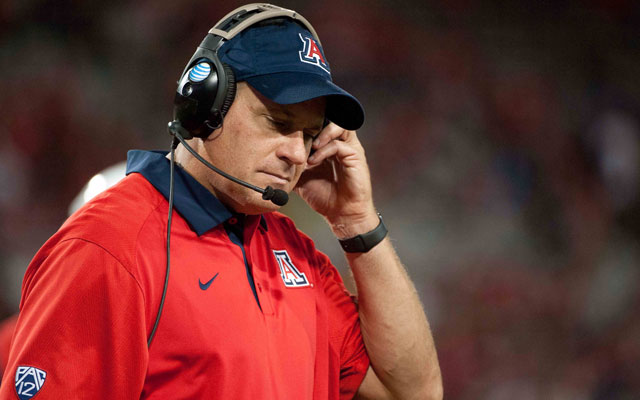Pac-12 commish: No fix for Ariz. game time issue
Negotiated television deals prevent the Pac-12 from acting on Arizona coach Rich Rodriguez’s complaint this week that the Wildcats play too many night road games, Pac-12 commissioner Larry Scott said Thursday.
“I’m sympathetic to his concerns, but in some instances, there are things we can do about it and in this case there’s really nothing we can do,” Scott said. “Our athletic directors and presidents and conference office agreed to give a certain amount of flexibility to broadcast partners to pick games and have nighttime broadcast windows. In exchange, we have blockbuster TV deals that have been incredibly beneficial to our schools and student-athletes from a resource and exposure perspective, and the trade-off is worth it.”
At his weekly news conference, Rodriguez went on a rant because the Wildcats’ Oct. 31 game at Washington will kick off at 8 p.m. PT. Arizona planned to file a formal complaint to the Pac-12, according to the Arizona Daily Star. The Wildcats also play 12 straight games this season without a bye. Rodriguez expressed concern his players will return from Washington around 5 a.m. and struggle to recover before a road trip the next week at USC.
“Don’t go on your soapbox and talk about student-athlete welfare and then have these kids get back at 5 or 6 in the morning,” Rodriguez told reporters this week. “If we’re in it for that part of it, there’s got to be a better way. At some point the conference has to have the ability to step in and say ‘Hey, give this team one afternoon road game. Maybe all the rest are at night, but give them one break so they can get home at a reasonable hour.’ It’s silly, it really is.”
Scott said he has not spoken with Rodriguez this week but did directly hear those concerns from Arizona athletic director Greg Byrne. Player welfare issues were “heavily, heavily considered” by Pac-12 schools when the league’s current TV deals with ESPN and Fox were approved in 2011, Scott said.
The Pac-12 receives $3 billion over 12 years from ESPN and Fox. The value of the deal increases by 5.1 percent each year until peaking at $321.3 million in 2024.
“Once those deals are approved, there’s very little wiggle room in terms of pulling back the flexibility for our broadcasters,” Scott said. “Where we have more flexibility is on the Pac-12 Networks. That’s why we opened up an 11 a.m. window on the Pac-12 Networks and pushed some games to Friday nights.”
Exclusive TV windows for ESPN and Fox also impact game times for the Pac-12. For instance, this Saturday’s USC-Utah game at 4:30 p.m. PT is an exclusive window for Fox, meaning no other Pac-12 games can be played during that time period.
“That really ties our hands when we can play the other games,” Scott said. “It’s complex. It gives you a little feel for why this is somewhat challenging based on the demands we decided to agree to in exchange for revenue.”
Rodriguez complaint was not only focused on the start time of games but what those late kickoffs leads to the following day and into the week.
“We’re not getting treatments on the plane,” he said. “You can try to sleep, but you’re not getting much rest while you’re traveling. … There has got to be a time after the game for them to catch their breath and get back in. To just have a day where you don’t have to think about football all the time. They have Mondays off, but they still have school. People ask, ‘Why don’t you give them Sunday off?’ When you get back 5 or 6 in the morning, you’re not really getting Sunday off. It’s not a good situation.”
Rodriguez’s complaint comes at a time when the Pac-12 has been at the forefront of proposing changes to address time demands required of college athletes in their sport.
“The truth is time demands is a much less serious concern with football student-athletes than basketball, volleyball or baseball,” Scott said. “There’s 12 contests. I don’t mean to be dismissive in any way of the concern. But if you compare time demands, it’s not as much, and you’re really talking about time away from classes and missed class time and overall burden.”
Fans have also complained about more night games in the Pac-12. Other than Arizona and Arizona State fans, which prefer night games early in the year due to heat, Scott said most Pac-12 fan bases he hears from want afternoon games.
“I understand that and our schools certainly understand that so it’s a balancing act and tradeoffs,” Scott said. “The highest priority in our mandate when we negotiated these TV contracts was how can we get more national exposure and revenue because a lot of our games were regionalized and we were fifth out of six in conference revenue? So there was a lot of interest in what we did.”
Follow and read more from Jon Solomon on Facebook and Twitter.
 Rich Rodriguez is not pleased with the Pac-12 and its TV partners. (USATSI)
Rich Rodriguez is not pleased with the Pac-12 and its TV partners. (USATSI)This entry passed through the Full-Text RSS service – if this is your content and you’re reading it on someone else’s site, please read the FAQ at fivefilters.org/content-only/faq.php#publishers.